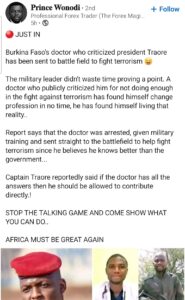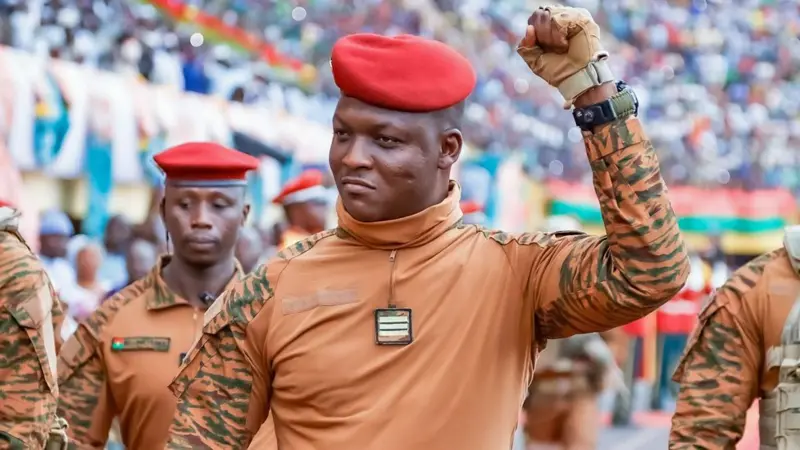Three years after taking power, Traoré’s populist showmanship and defiant rhetoric mask a grim reality of insecurity, poverty, and political isolation — far from the Sankarist revival he promises.
By Oumarou Sanou
Three years after seizing power, Burkina Faso’s strongman, Captain Ibrahim Traoré, continues to project himself as the torchbearer of a new African revolution — a reincarnation of the late Thomas Sankara. Yet, his recent performance, marking his third anniversary in power, revealed more theatre than substance. It was less a presidential address and more a self-congratulatory monologue filled with sweeping claims, imagined enemies, and revolutionary soundbites detached from the harsh realities on the ground.
Facing a carefully selected group of journalists — those unlikely to ask uncomfortable questions — Traoré transformed what should have been a serious state briefing into a one-man show. His tone was confident, even prophetic, yet far removed from the desperation of a nation caught in the grip of terrorism, poverty, and displacement.
Traoré opened with drama: when he came to power, he claimed, the Burkinabe army had “barely a hundred weapons and 100,000 cartridges.” Such exaggerations might thrill loyalists but stretch credibility. Even local hunters would scoff at such arithmetic. Yet, the captain reassured his listeners that 15,000 men are now recruited annually and that Burkina Faso will soon “make its own weapons.”
How, and with what resources? There were no details — no factories, no engineers, no budget. It was a familiar populist pattern: imagination over implementation, rhetoric over realism.
Then came a moment of unintended honesty. “Politics in Africa,” Traoré lectured, “is the art of lying, deceiving, and flattering.” Was this a denunciation of the old political elite, a confession of his own methods, or the mission statement of his self-styled “Progressive Popular Revolution”?
Pressed for specifics, Traoré was blunt: “I’m not going to tell you the exact content.” In other words, the people are expected to believe in a revolution whose goals remain secret. It is governance through mystique — a convenient cloak for opacity and improvisation.
Perhaps the highlight — or low point — of the press conference came with the grand economic announcement: a tomato processing plant. While jihadists overrun villages and thousands of civilians flee daily, the government’s big victory was the promise of locally made tomato paste.
Agricultural processing is undoubtedly essential. But in a nation where more than half of the territory is under terrorist control, the symbolism felt jarring. The message seemed to be: Burkina may not be safe, but at least it will have sauce.
When policies fail, populists find scapegoats. In Traoré’s narrative, the Ivory Coast has now become the enemy. He accused Abidjan of serving as “the rear base of Burkina’s enemies” and even suggested that President Alassane Ouattara had signed a “non-aggression pact” with jihadists.
Such allegations are not just far-fetched — they are dangerous. They strain regional diplomacy, alienate neighbours, and distract from the government’s inability to secure its own borders. Ironically, when a journalist cited a poll showing that 66% of Ivorians viewed Burkina Faso’s leadership favourably, Traoré shrugged: “Really? I don’t follow that… I don’t watch those media outlets anymore.”
This was revealing. In a state where the media is censored and dissent suppressed, even positive news struggles to reach the leader’s ears. Traoré appears trapped within his own echo chamber — and Burkina Faso with him.
Three years on, the outcomes are damning. Burkina Faso remains the most terrorised country in the world. Thousands have been killed, millions displaced, and much of the countryside is beyond state control. Schools are closed, health centres are abandoned, and basic livelihoods are destroyed.
Despite fiery anti-Western speeches and his warm embrace of Moscow, little has changed on the ground. Russian mercenaries and propaganda can amplify slogans, but they cannot rebuild schools, protect farmers, or restart an economy in free fall.
And now, with Burkina Faso — alongside Niger and Mali — having withdrawn from ECOWAS, the country faces deepening isolation. What Traoré brands as “sovereign independence” increasingly looks like self-imposed solitude. Without regional cooperation, intelligence sharing, or trade partnerships, Burkina Faso risks turning into a garrison state — fortified in rhetoric but hollow in results.

In just three hours of speaking, Captain Traoré managed to: turn the Ivory Coast into the supposed headquarters of Sahel’s villains; declare tomato paste the new pillar of national resilience; and redefine politics as the art of deception.
But beyond the theatre, Burkina Faso continues to bleed. The ordinary people — farmers, students, traders, and families — pay the real price for this illusion of revolution.
Traoré may parade as the new Sankara, but three years on, his “revolution” looks more like a parody than a legacy. The real revolution Burkina Faso needs today is not one of slogans or posturing, but of results — restoring security, rebuilding trust, and reviving governance.
Until then, Captain Ibrahim Traoré’s revolution remains exactly what it appears to be: a show more than a solution.
Oumarou Sanou: Social critic, Pan-African observer and researcher focusing on governance, security, and political transitions in the Sahel. He writes on geopolitics, regional stability, and the evolving dynamics of African leadership. Contact: sanououmarou386@gmail.com

